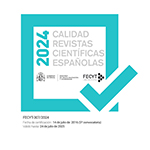Public libraries and the integration of technologies in the seniors
The case of the province of Badajoz (Extremadura, Spain)
Abstract
Seniors are fundamental in actual society. The number of seniors is growing, and their longevity is becoming more apparent every day. The public library is a social and cultural center; therefore, it must be an instrument that improves the quality of life of this sector, favoring their access to information and communication technologies to reduce the digital divide in this sector of the society. Therefore, the objective of this work is to verify the situation of public libraries in the province of Badajoz (Extremadura) in relation to the technologies that they offer to the seniors. The methodology used begins with the design of a questionnaire divided into 6 specific categories on technology and a total of 40 questions, and its subsequent delivery to 64 Badajoz public libraries, participants in a previous study, with a response rate of 50% (32 libraries). Through the use of descriptive statistics, the main results show that, although the elderly who go to the library use the internet and social networks in a proportion lower than 47%, however, 87.5% of the respondents consider that the use of technology in the library by this sector has increased considerably in recent years, favoring their integration into society. Despite this, it is concluded that the lack of specialized librarians, the need for continuous training in technologies and the scarce funding, do not favor the Badajoz public libraries to fully adapt to technological change.
Downloads
Article download
License
In order to support the global exchange of knowledge, the journal Revista General de Información y Documentación is allowing unrestricted access to its content as from its publication in this electronic edition, and as such it is an open-access journal. The originals published in this journal are the property of the Complutense University of Madrid and any reproduction thereof in full or in part must cite the source. All content is distributed under a Creative Commons Attribution 4.0 use and distribution licence (CC BY 4.0). This circumstance must be expressly stated in these terms where necessary. You can view the summary and the complete legal text of the licence.











